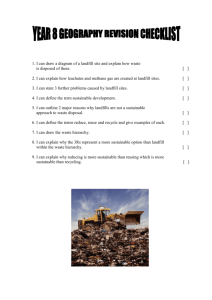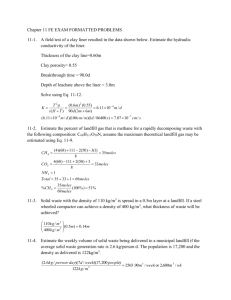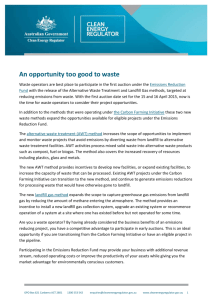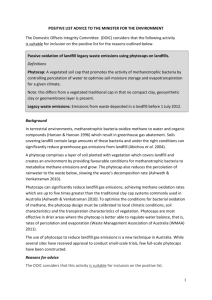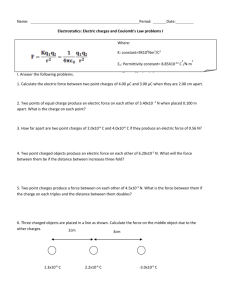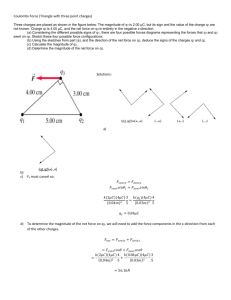Voluntary Waste Industry Protocol for the handling of early collected
advertisement
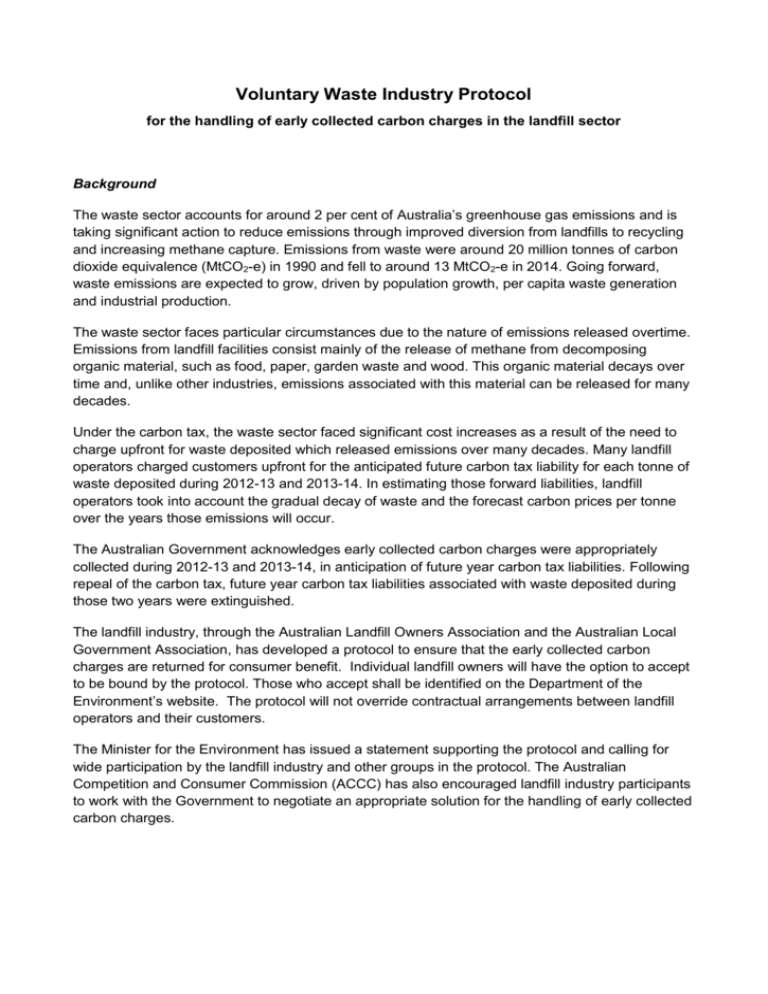
Voluntary Waste Industry Protocol for the handling of early collected carbon charges in the landfill sector Background The waste sector accounts for around 2 per cent of Australia’s greenhouse gas emissions and is taking significant action to reduce emissions through improved diversion from landfills to recycling and increasing methane capture. Emissions from waste were around 20 million tonnes of carbon dioxide equivalence (MtCO2-e) in 1990 and fell to around 13 MtCO2-e in 2014. Going forward, waste emissions are expected to grow, driven by population growth, per capita waste generation and industrial production. The waste sector faces particular circumstances due to the nature of emissions released overtime. Emissions from landfill facilities consist mainly of the release of methane from decomposing organic material, such as food, paper, garden waste and wood. This organic material decays over time and, unlike other industries, emissions associated with this material can be released for many decades. Under the carbon tax, the waste sector faced significant cost increases as a result of the need to charge upfront for waste deposited which released emissions over many decades. Many landfill operators charged customers upfront for the anticipated future carbon tax liability for each tonne of waste deposited during 2012-13 and 2013-14. In estimating those forward liabilities, landfill operators took into account the gradual decay of waste and the forecast carbon prices per tonne over the years those emissions will occur. The Australian Government acknowledges early collected carbon charges were appropriately collected during 2012-13 and 2013-14, in anticipation of future year carbon tax liabilities. Following repeal of the carbon tax, future year carbon tax liabilities associated with waste deposited during those two years were extinguished. The landfill industry, through the Australian Landfill Owners Association and the Australian Local Government Association, has developed a protocol to ensure that the early collected carbon charges are returned for consumer benefit. Individual landfill owners will have the option to accept to be bound by the protocol. Those who accept shall be identified on the Department of the Environment’s website. The protocol will not override contractual arrangements between landfill operators and their customers. The Minister for the Environment has issued a statement supporting the protocol and calling for wide participation by the landfill industry and other groups in the protocol. The Australian Competition and Consumer Commission (ACCC) has also encouraged landfill industry participants to work with the Government to negotiate an appropriate solution for the handling of early collected carbon charges. ‘Waste Industry Protocol’ This protocol sets out guidance on how landfill operators (‘we’) will handle early collected carbon charges. 1. Calculation and disclosure of early collected carbon charges held We undertake to: Report in confidence to the Department of the Environment by the end of 2015 the total of early collected carbon charges we each held/hold prior to any refunds (i.e. a dollar figure). This calculated total amount, as well as any allowed deductions for administration costs (which will not be more than 10% of the early collected carbon charges), surrender costs and corporate tax (where already paid), will be verified by an independent auditor. It is this total of early collected carbon charges, prior to any refunds but less allowed deductions, that will be subject to this protocol. 2. Acquitting early collected carbon charges We undertake to: Refund carbon charges to our local government customers for their kerbside collected waste. Acquit any remaining non-refunded charges through either of the following options: (a) Investing in abatement projects; or (b) Purchasing carbon abatement credits and voluntarily transferring them to the Government. 3. Investment in projects In relation to project investment, we undertake to: Invest any un-refunded charges only in projects that meet the following criteria: (a) are additional to business-as-usual; (b) have emissions reduction as one of their purposes, such as renewable energy, energy efficiency, fuel switching, landfill gas capture or waste diversion from landfill; (c) not be registered as an ERF project, either at the time of investment or in the future, or generate offset units. Publically disclose the name, location and brief description of all projects. 4. Purchase of abatement credits In relation to the purchase of abatement credits, we undertake to: Purchase high quality abatement credits – to be determined by agreement with the Minister for the Environment. Report in confidence to the Department of the Environment details of the purchase date, average purchase price and number of abatement credits purchased. Voluntarily transfer these credits to the Clean Energy Regulator. 5. Timeframes We undertake to: Issue refunds to local government customers within 60 days of agreement being reached between each customer and landfill owner on the refund amount. Commit to the acquittal of all un-refunded carbon charges by 31 December 2016. Incur any expenditure, being either investment in projects or purchase of abatement credits, by 31 December 2017. 6. Verification reporting and disclosure We undertake to provide the Department of the Environment with the following independent auditor reports, from each entity holding early collected carbon charges: By 31 December 2015: An auditor statement verifying that the total amount of early collected carbon charges subject to this protocol and any allowed deductions (as described in section 1 of this protocol) have been correctly calculated. By 31 December 2016, and annually thereafter until all funds are acquitted: an auditor statement setting out the percentage of the total charges held that have been acquitted through refunds, project investment and purchase of abatement credits. By 30 June 2017: An auditor statement verifying that each eligible project implemented using the un-refunded charges either has achieved, or can reasonably be expect to achieve, emissions reductions. Auditor’s statements may be published on the website of the Department of the Environment.

